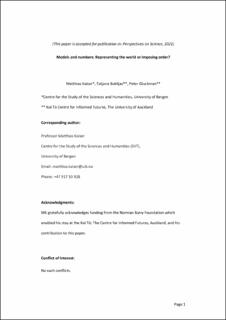Models and numbers: Representing the world or imposing order?
| dc.contributor.author | Kaiser, Matthias | |
| dc.contributor.author | Buklijas, Tatjana | |
| dc.contributor.author | Gluckman, Peter | |
| dc.date.accessioned | 2022-03-11T12:11:00Z | |
| dc.date.available | 2022-03-11T12:11:00Z | |
| dc.date.created | 2022-01-19T09:26:53Z | |
| dc.date.issued | 2021 | |
| dc.identifier.issn | 1063-6145 | |
| dc.identifier.uri | https://hdl.handle.net/11250/2984635 | |
| dc.description.abstract | We argue for a foundational epistemic claim and a hypothesis about the production and uses of mathematical epidemiological models, exploring the consequences for our political and socio-economic lives. First, in order to make the best use of scientific models, we need to understand why models are not truly representational of our world, but are already pitched towards various uses. Second, we need to understand the implicit power relations in numbers and models in public policy, and, thus, the implications for good governance if numbers and models are used as the exclusive drivers of decision making. | en_US |
| dc.language.iso | eng | en_US |
| dc.publisher | MIT Press | en_US |
| dc.title | Models and numbers: Representing the world or imposing order? | en_US |
| dc.type | Journal article | en_US |
| dc.type | Peer reviewed | en_US |
| dc.description.version | acceptedVersion | en_US |
| dc.rights.holder | Copyright 2021 The Massachusetts Institute of Technology | en_US |
| cristin.ispublished | true | |
| cristin.fulltext | postprint | |
| cristin.qualitycode | 1 | |
| dc.identifier.doi | https://doi.org/10.1162/posc_a_00373 | |
| dc.identifier.cristin | 1984305 | |
| dc.source.journal | Perspectives on Science | en_US |
| dc.identifier.citation | Perspectives on Science. 2021 | en_US |
